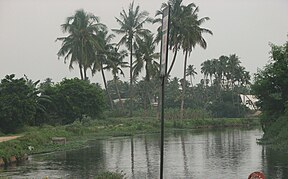| Kalingarayan Canal | |
|---|---|
 Canal near Erode Canal near Erode | |
| Specifications | |
| Length | 56.5 miles (90.9 km) |
| Status | open |
| History | |
| Date completed | 1283; 742 years ago (1283) |
| Geography | |
| Branch of | Bhavani River |
Kalingarayan Canal is a 56.2-mile (90.5 km) long irrigation canal in the Erode district, Tamil Nadu, India. It was constructed by Kongu chieftain Lingaya Kalingaraya Gounder. The canal's source is the Kalingarayan Anicut near Bhavani. The canal irrigates approximately 15,743 acres (6,371 ha) of agricultural land. The project including construction of the dam and canal started in 1271 and was completed in 1283.
Design and architecture
The canal connects Bhavani and Noyyal rivers, two major tributaries of the Kaveri. It is one of the oldest river linking projects in India. The canal begins at Kalingarayan Anicut on Bhavani river and joins Noyyal river near Kodumudi. The canal is 56 miles (90 km) long and was constructed in a wave pattern to reduce water damage to the canal banks and increase the ground water table. The canal crosses three other canals via aqueducts namely Sunnambu canal near Suriyampalayam, Pichaikaranpallam Canal near BP Agraharam and Perumpallam Canal near Karaivaikkal.
Environmental threat
As the initial portion of the canal runs through the highly industrialized and urbanized areas of Erode Municipal Corporation, the discharge of untreated effluents from the textile dyeing units and leather tanneries introduce major pollutants. To prevent mixing of sewage into the canal, Government of Tamil Nadu plans to build concrete walls on the sides and an additional canal of 15 kilometres (9.3 mi) has been constructed alongside the main canal to carry the sewage. The entire stretch of first 30 km (19 mi) of the canal running through Erode Municipal Corporation is proposed to be provided with concrete lining in a phased manner. Navigable roads were developed along the banks throughout this stretch to reduce access to the canal.
See also
References
- "Kalingarayan sluices opened, Erode all set for farming". The Hindu. 20 June 2011. Retrieved 23 December 2016.
- "Kalingarayan Canal is 725 years old". The Hindu. 17 January 2007. Retrieved 23 December 2016.
- "Memorial in Honour of Kalingarayan-CM". New Indian Express. 20 September 2013. Retrieved 23 December 2016.
- Kalingarayan Canal Water Quality Study (PDF) (pdf). Central Pollution Control Board. Retrieved 23 December 2016.
- "Kalingarayan Canal turns 727". The Hindu. Retrieved 23 December 2016.
- "Sewage, a threat to Kalingarayan Bridge". The Hindu. 29 September 2016. Retrieved 23 December 2016.
- Kalingarayan the Great and the Kalingarayan Canal, page-43 (pdf). N.Pushparaj-Pavendhan Memorial Trust. Retrieved 23 December 2016.
- "Pollution of Kalingarayan Canal continues unabated". The Hindu. 8 July 2016. Retrieved 23 December 2016.
- "Erode Kalingarayan Canal to get a facelift soon". The Hindu. 1 April 2013. Retrieved 23 December 2016.
- "More water flow into Kalingarayan Canal brings relief for tail-end farmers". The Hindu. 30 July 2014. Retrieved 23 December 2016.
- "Expedite third phase of Concrete lining of Kalingarayan Canal". The Hindu. 25 May 2015. Retrieved 23 December 2016.
- "Minister inspects Kalingarayan Canal works". The Hindu. 21 May 2023. Retrieved 23 December 2016.
| Bhavani river | |
|---|---|
| Tributaries |
|
| Dams |
|
| Canals | |
| Features | |
| Major cities and towns | |
| Riparian states | |
11°03′N 77°54′E / 11.050°N 77.900°E / 11.050; 77.900
This Erode district location article is a stub. You can help Misplaced Pages by expanding it. |